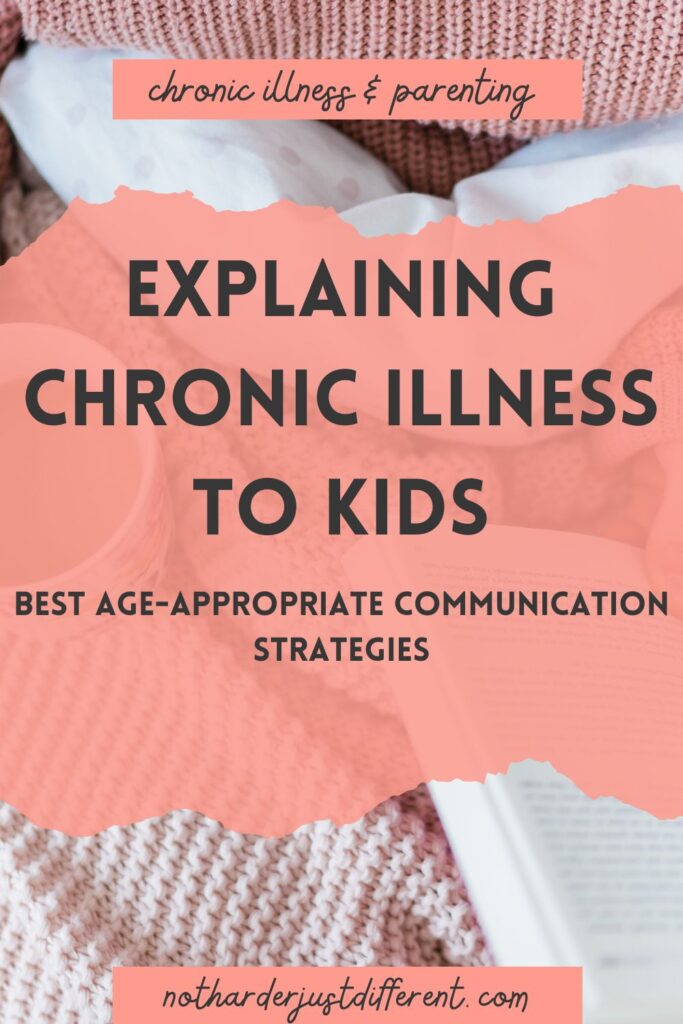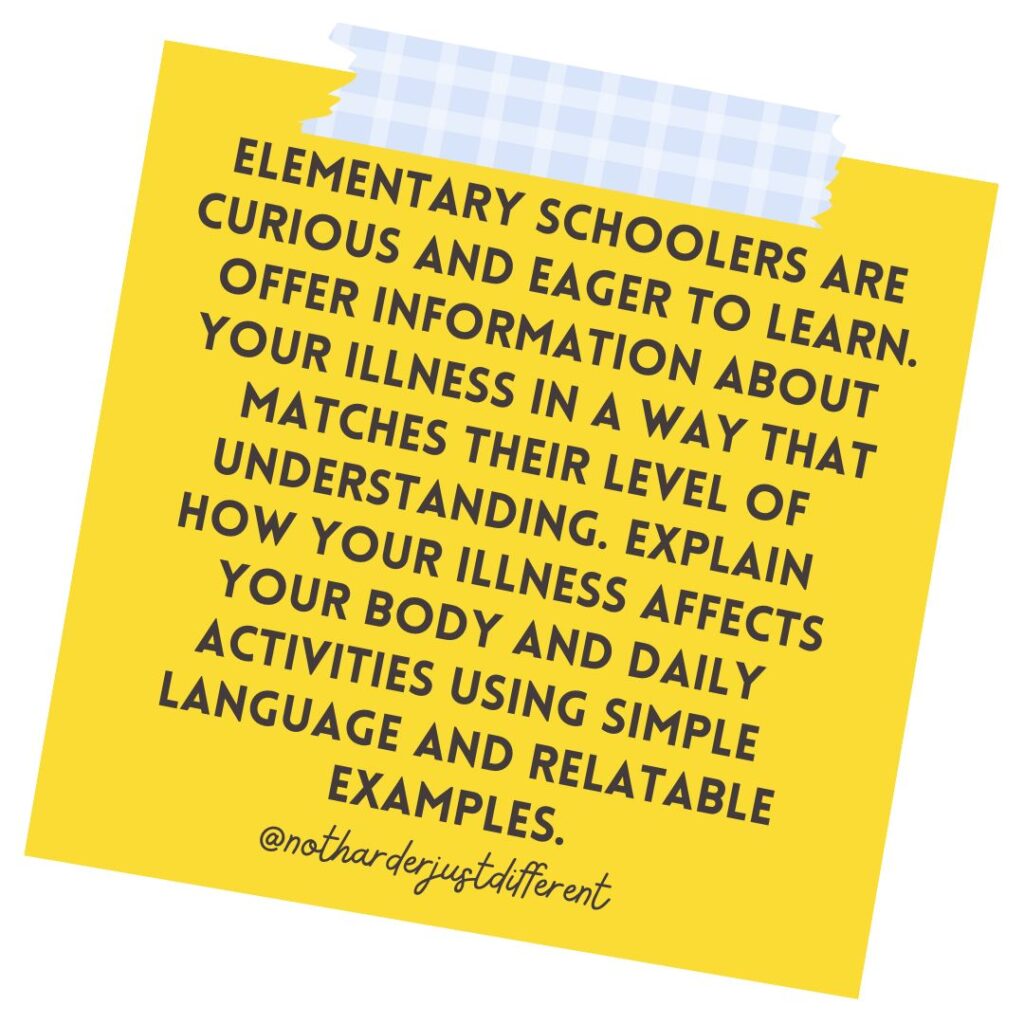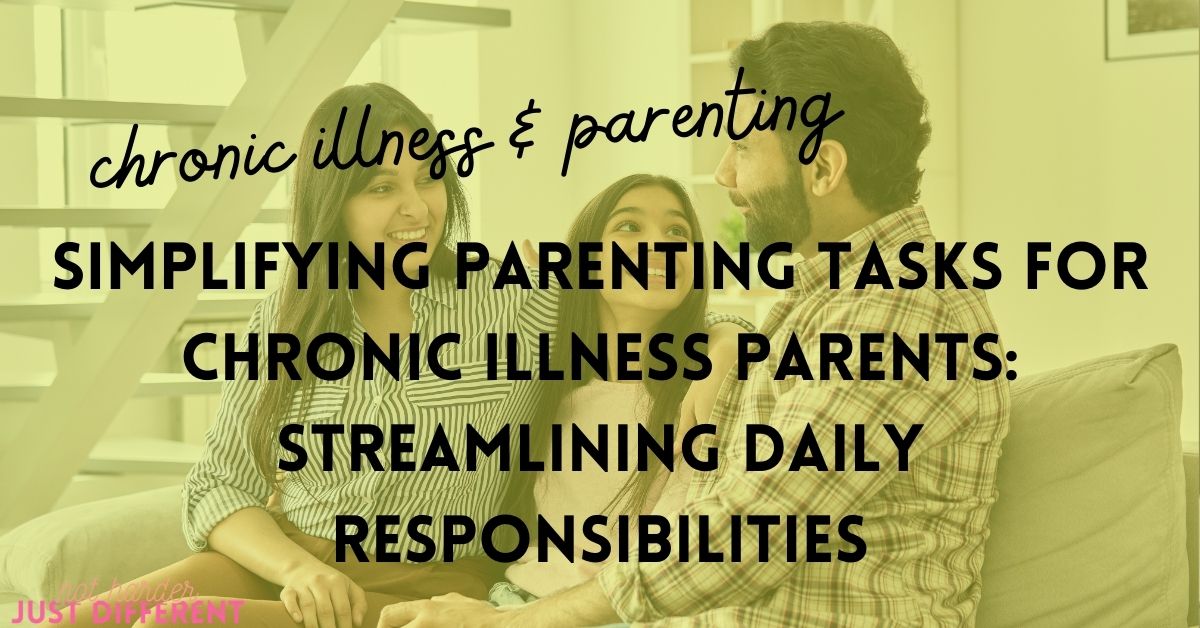Disclaimer: As a future Licensed Clinical Social Worker (LCSW) currently pursuing my master’s degree, I am passionate about sharing insights and information related to parenting, autism and homeschooling based on my personal experiences and research. However, the content shared on this blog is not intended to substitute professional advice, diagnosis, or treatment. Parenting is a deeply personal journey, and while I strive to provide valuable insights, every family and situation is unique. Readers are encouraged to consult with qualified professionals for personalized guidance tailored to their specific needs and circumstances.
Explaining your chronic illness to your little ones can feel like embarking on a quest into uncharted territory. But it doesn’t need to be scary, with these tried-and-true strategies to make these conversations a breeze. From toddlers to teens, I have some age-appropriate communication techniques that’ll help you navigate these discussions with confidence and clarity. With the right approach, you can empower your children with understanding and empathy, fostering open communication and strengthening your family bonds.

Explaining Chronic Illness to Kids
Toddlers and Preschoolers (Ages 2-5)
Keep it Simple
Toddlers and preschoolers thrive on simplicity. Use language they can understand, such as “mommy’s body feels tired sometimes, so I need to rest.” Keep explanations brief and straightforward, avoiding complex medical terms that may confuse them. By keeping it simple, you lay a foundation of understanding without overwhelming their young minds.
Reassure Them
Young children may blame themselves for your illness or worry about your well-being. Reassure them that it’s not their fault and that you have doctors who help you feel better. Offer plenty of hugs and cuddles to reassure them of your love and care, emphasizing that your illness doesn’t change your love for them. Building this sense of security helps them feel safe and supported during uncertain times.
Use Visual Aids
Toddlers and preschoolers are visual learners. Utilize age-appropriate books, drawings, or even toys to illustrate what’s happening in a way they can grasp. Simple picture books or drawings can help them understand abstract concepts like pain or fatigue. Engage in imaginative play where they can pretend to be doctors or caregivers, fostering a sense of understanding and empowerment.
Encourage Questions
Create an open environment where they feel comfortable asking questions about your illness. Encourage curiosity and validate their inquiries, even if you’ve answered the same question multiple times. By fostering an atmosphere of open communication, you build trust and strengthen your bond with your little ones, laying the groundwork for future discussions.
Normalize Feelings
It’s essential to validate their emotions and let them know that it’s okay to feel worried or confused. Share stories or read books about characters facing similar challenges, emphasizing resilience and coping strategies. By normalizing their feelings, you help them understand that they’re not alone in their emotions and that it’s natural to feel a range of feelings during difficult times.

Elementary Schoolers (Ages 6-11):
Provide Age-Appropriate Details
Elementary schoolers are curious and eager to learn. Offer information about your illness in a way that matches their level of understanding. Explain how your illness affects your body and daily activities using simple language and relatable examples. Provide concrete details without overwhelming them with medical jargon, allowing them to grasp the basics while feeling informed and empowered.
Be Honest
Honesty is key when discussing your chronic illness with elementary schoolers. Answer their questions truthfully, acknowledging the challenges while emphasizing your efforts to manage your health. Encourage an open dialogue where they feel comfortable expressing their concerns and thoughts. By being transparent, you build trust and credibility, fostering a sense of security and understanding within your family.
Encourage Expression
Elementary schoolers may experience a range of emotions when learning about your illness. Create a safe space where they can express their feelings without judgment. Listen actively to their concerns and validate their emotions, reassuring them that it’s normal to feel a mix of emotions. Encourage them to share their thoughts through art, journaling, or conversations, empowering them to process their feelings and find healthy ways to cope.
Share Coping Strategies
Teach your children simple coping strategies to navigate their feelings and support you during challenging times. Explore relaxation techniques like deep breathing or mindfulness exercises that they can practice independently or with your guidance. Encourage them to engage in activities they enjoy, such as drawing, playing, or spending time outdoors, as a means of self-care and stress relief. By equipping them with practical tools, you empower them to be active participants in managing family dynamics while promoting their own well-being.
Empower Them
Empowerment is key to helping elementary schoolers understand and cope with your chronic illness. Reassure them that your illness isn’t contagious and that they can’t “catch” it from you. Educate them about healthy boundaries and hygiene practices to maintain their well-being. Encourage them to ask questions and seek clarification whenever they feel uncertain, fostering a sense of autonomy and responsibility in managing their health and relationships. By empowering them with knowledge and understanding, you nurture their resilience and adaptability, preparing them to navigate life’s challenges with confidence and compassion.
Teens (Ages 12 and up):
Open Dialogue
Adolescence is a time of increased independence and curiosity. Initiate honest conversations with your teens about your chronic illness, creating an environment where they feel comfortable asking questions and expressing their concerns. Encourage open dialogue by actively listening to their perspectives and experiences, validating their emotions, and fostering mutual respect. By establishing a foundation of trust and transparency, you strengthen your relationship and empower them to navigate complex family dynamics with maturity and understanding.
Respect Autonomy
Recognize your teens’ growing autonomy and involve them in discussions about your illness and its impact on family life. Respect their opinions and preferences, allowing them to participate in decision-making processes regarding your care and household responsibilities. Provide opportunities for them to take on age-appropriate roles and responsibilities, fostering a sense of ownership and contribution within the family dynamic. By respecting their autonomy, you validate their capabilities and promote a sense of empowerment and independence.
Provide Resources
Offer your teens access to educational resources, books, articles, or support groups where they can learn more about your chronic illness and connect with peers facing similar challenges. Encourage them to explore topics related to health, wellness, and coping strategies, empowering them to become informed advocates for themselves and their loved ones. Provide guidance and support as they navigate these resources, emphasizing the importance of critical thinking, empathy, and self-care in managing their emotional and physical well-being.
Normalize Feelings
Adolescence is a time of intense emotions and self-discovery. Normalize your teens’ feelings by acknowledging the complexity of emotions they may experience in response to your chronic illness. Encourage them to express their thoughts, fears, and frustrations in a safe and nonjudgmental space. Validate their emotions and experiences, emphasizing that it’s natural to feel a range of emotions, including sadness, anger, or anxiety, in response to challenging circumstances. By normalizing their feelings, you help your teens develop emotional resilience and coping skills that will serve them well throughout their lives.
Offer Support
Be a source of unconditional support and understanding for your teens as they navigate the complexities of adolescence while coping with your chronic illness. Listen attentively to their concerns and experiences, offering empathy, guidance, and reassurance without judgment. Provide access to mental health resources, such as counseling or therapy, if they express a need for additional support. Encourage healthy coping mechanisms, such as exercise, creative expression, or spending time with supportive friends and family members, to help them manage stress and maintain emotional well-being. By offering ongoing support and encouragement, you empower your teens to cultivate resilience, self-compassion, and optimism in the face of adversity.

